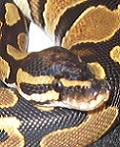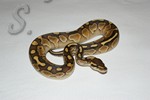» Site Navigation

1 members and 2,630 guests
Most users ever online was 6,337, 01-24-2020 at 04:30 AM.
» Today's Birthdays

» Stats

Members: 75,079
Threads: 248,524
Posts: 2,568,620
Top Poster: JLC (31,651)
|
-
Registered User

Best care for newly imported babies?
We got 20 newly imported farm hatched babies at the Orlando Repticon this past Saturday for $7.50 each. We thought it would be fun to do and would be able to sell them fairly easily. As Sunday came around I realized how big of a responsibility we had actually taken on. So I figured it best to come here and tap into the knowledge and experience of the members on this forum.
I have had snakes all my life off and on and got bitten by the bug again last year. My son started it off with a ball python, followed by my wife with her first ball, and so on and so on.... Now we have 3 boas, 3 balls, and 2 corns in addition to the new babies. We both have experience dealing with pets of all kinds and various levels of medical care for them. My wife is also a tech at the emergency vet clinic here. I have done a lot of reading and talking in the last few months and have learned a huge amount about caring for these guys. I am also fortunate enough to be friends with 2 local ball python breeders and a very helpful reptile shop owner.
So here is what we have done so far and what we plan to do. When we got home Saturday, they all got a soak for a couple of hours to get them rehydrated and then were moved into a 30 gl long tank. We went shopping and got Sterilite 6qt tubs and water dishes. Sunday morning I drilled the tubs and went to get some extra things we forgot. One of them was PAM to treat each baby, but the store was out of that so I got "Reptile Spray" instead. But, by the time I got back, my wife had already weighed and ID'd each one and put them into their own tubs. There are no signs of mites, but I plan to treat them anyway. They got their hides today. They're stacked beside me in a small area with over 300 gallons of aquariums, so the room is a constant 65-70% humidity and 85*. One of them just shed and it was in one piece, so at least the humidity is good.
For feeding I thought I would try each one on f/t mice fuzzies since we have dozens of those already. If any take them fine, we'll just keep going with hoppers, small mice, rat fuzzies, etc. If they don't I think the best first offering is hoppers so as not to overload their systems after not having eaten in who knows how long, then move them to the appropriate sized prey.
As far as medical care, we plan to observe closely and only those that are beyond what we are comfortable dealing with will go to the vet. I am not sure about worming or any other treatment that might be a good preventative measure. I know of the use of Panacure and Flagyl and can administer either orally or by injection.
I would like to see each one eat at least 3 times and poop and shed before they are put up for sale. Some of these guys are very nice looking - one has a black stripe down it's back, one could be a granite, a few have lots of white around the alien heads, some with nice neck or tail stripes, some unusual patterns and one that looks like a sable.
Any and all comments, suggestions, ideas, etc are very much welcomed.
Jeff
-
-
BPnet Veteran


Re: Best care for newly imported babies?
 Originally Posted by zn394

For feeding I thought I would try each one on f/t mice fuzzies since we have dozens of those already. If any take them fine, we'll just keep going with hoppers, small mice, rat fuzzies, etc. If they don't I think the best first offering is hoppers so as not to overload their systems after not having eaten in who knows how long, then move them to the appropriate sized prey.
to help with heart/headache I would start with feeding the imports live hopper mice before anything else (unless you know what they have specifically fed on) good luck 
-
-
Registered User

Re: Best care for newly imported babies?
I would really like to get some feedback on this. Would this be more appropriate in another thread? General Husbandry perhaps? Moderators?
-
-
Registered User


Re: Best care for newly imported babies?
Personally I think you have done great thus far. I agree that you should feed imports live first and then go to frozen thawed in a few weeks dependent upon each individuals feeding response. 6qt tubs are perfect for hatchlings, I wouldn't change that until they hit about 300-400grams or so. I would worm each, just to be safe. It won't hurt them at all. I would give each a bath with a little "reptile spray" as you said. But from what you have done and are going to do there isn't much to add. You are pretty much taking the proper/exact measures needed for those imports. 
-
-
Registered User


Re: Best care for newly imported babies?
Unless I miss my guess, most farm babies have not fed at all, so the issue you may have will be trying to convince 20 babies to eat. This was the case with my first three BP's who I purchased with no clue that they were straight off the boat so to speak... Don't dispare though, they will eat!! Sooner or later 
Best of luck with them all! Sounds like fun!
-
-
Re: Best care for newly imported babies?
Even captive bred and hatched babies do best when their first meals are live.
Try getting live hopper mice for their first few meals, then work on switching to f/t. Very rarely will a baby take f/t as their first meal, they simply won't recognize it as food.
-
-
BPnet Veteran


Re: Best care for newly imported babies?
I went through all the same things when i purchased 10c.h. babies from africa, your best bet is to feed them live first, I recommend this because I feel like it starts them off with a strong feeding response, then later down the road you can try to convert them to f/t. Hope this helps
-
-
Registered User

Re: Best care for newly imported babies?
Thanks guys. Live hoppers is where we are right now. 16 are ready to eat again and we have our fingers crossed on the other 4.
One of these guys was 35g. From what I have read they tend to be 50-60ish right out of the egg. The weights range from this little guy (who ate twice already  ) to 104g. ) to 104g.
From what some of you are saying we are dealing with hatchlings and just need to be worried about it from that perspective as much as them being newly imported, right?
This is interesting to say the least and a great experience. I'll be much better prepared for next year when I breed my first pair of boas and in 2 years when we breed my wife's balls. Reminds me of my first angelfish spawn - I was freaking out about doing it right, but it all worked out OK and now I can have a spawn anytime I want. Actually had to separate all the pairs because there were waaaay too many little angels around here!
-
-
BPnet Veteran


Re: Best care for newly imported babies?
Zn394
I just started 12 of these hatchlings. This is what I did.
I set them up in 6 QT tubs with a paper towel, water bowl and a hide in each tub. I am feeding hoppers every 5 days. After I fed a few meals and I was left with 3 that had not taken their first meal yet. Those 3 I switched from paper towel to Aspen and waited till the next feeding day. This trick got the remaining 3 to take their first meal for me.
Also when I am trying to feed the shy ones, I will put the hopper in the tub, close it up and step back just so the hatchling doesn’t feel threatened by my presence.
Good luck with them.
I hope this helps.
-
-
Re: Best care for newly imported babies?
 Originally Posted by zn394

From what some of you are saying we are dealing with hatchlings and just need to be worried about it from that perspective as much as them being newly imported, right?
Bingo! The only thing that's really much different between a captive bred and born baby and a new import is the stress level (from the trip over and then a show environment) that you want to reduce by minimal to no handling until you have a few meals in them.
Once they're well on their way to feeding, there's no difference in behavior than one born and bred here.
The only other thing you'll want to do, is get some fecal samples into your vet to make sure there are no internal parasites. Some exporters will pack them up right as they hatch and get them over here, not allowing them to drink the local water, and those tend to be "cleaner". Those allowed to drink the local water usually come over with some "baggage". 
-
 Posting Permissions
Posting Permissions
- You may not post new threads
- You may not post replies
- You may not post attachments
- You may not edit your posts
-
Forum Rules
|








 Reply With Quote
Reply With Quote







 ) to 104g.
) to 104g.